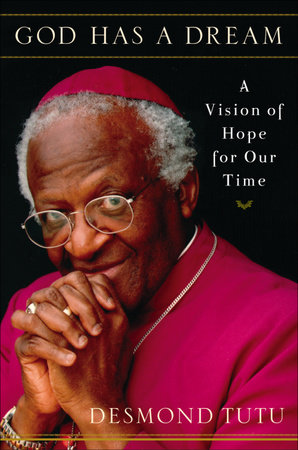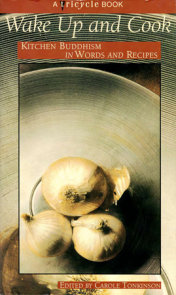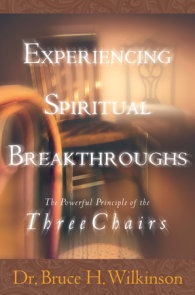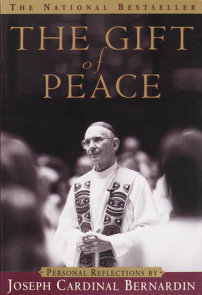READERS GUIDE
Postscript IISharing God’s Dream: Questions for Reflection and Discussion
Dear Child of God, the following quotes and questions are provided as an opportunity to help bring God’s dream more deeply into your life and the life of those in your family and community.
I hope you will take some quiet prayer and meditation time to reflect on these questions. Often when I pray, I visualize myself witnessing the actual scenes inthe Bible and this helps me to understand their teachings. If we can see something in our mind, we are often more likely to experience it in our lives and realize it in our world. Try to truly see and feel your answers, not just to think about them. Do not fear strong emotions, even tears. Only by opening our heart can we hope to transform and redeem the pain we carry. As we unburden ourselves, we are less likely to act out our suffering on others, and we move closer to realizing God’s dream for us.
As brothers and sisters in God’s family, it is equally important to share God’s dream with one another and to gain support and sustenance for the challenges we face. Who in your life is suffering and is in need of hope? Who could benefit from hearing of God’s dream? You may also wish to consider organizing a study group at your church, synagogue, temple, mosque, or simply among your friends and family. Together, arm in arm, heart to heart, there really is nothing that can stop us—no suffering that cannot be transfigured, no injustice that can withstand God’s love expressed through our caring and conviction.
Introduction
. . . we all experience sadness, we all come at times to despair, and we all lose hope that the suffering in our lives and in our world will ever end. (p. vii)
Where in your life are you experiencing sadness, despair, and suffering? Consider the hardships that exist in your own life and in the lives of your close friends and family. What might help transform this suffering? Now take a moment to focus on the suffering in our world that we try so hard to ignore. What might help transform it?
The most likely person, the most improbable situation— these are all “transfigurable”—they can be turned into their glorious opposites. (p. viii)
We have all witnessed some amazing turnarounds. Can you think of a person—maybe you—or a situation that looked like it was unredeemable and yet was transfigured? What happened? What allowed the transformation to take place?
1. God Believes in Us
This is a moral universe, which means that, despite all the evidence that seems to be to the contrary, there is no way that evil and injustice and oppression and lies can have the last word. (p. 2)
Do you believe this statement? If so, what supports your belief? If not, what calls it into question?
God marvelously, miraculously cares about each and every one of us. . . . And so God says to you, “I love you. You are precious in your fragility and your vulnerability. Your being is a gift.” (pp. 8–9)
Do you feel God’s love for you? Where do you feel fragile and vulnerable in your life? How would you live differently if you felt that God truly cared about you and loved you and that your life was a gift to you and to the world?
Many people believe that they are beyond God’s love….God’s love is not cut off from anyone. However diabolical the act, it does not turn the perpetrator into a demon. When we proclaim that someone is subhuman, we not only remove for them the possibility of change and repentance, we also remove from them moral responsibility. (pp. 10–11)
Are there things about you or things you have done that you sometimes believe make you unlovable? Are there things that othershave done to you that you think make them unlovable to God? Can you see them as God does, with love, as precious, as his children?
Our ability to do evil is part and parcel of our responsibility to do good. One is meaningless without the other. Empathy and compassion have no meaning unless they occur in a situation where one could be callous and indifferent to the suffering of others. To have any possibility of moral growth there has to be the possibility of becoming immoral. (p. 13)
When have you shown empathy and compassion when you could havebeen callous and indifferent? When were you callous and indifferent? When could you have been more loving to a family member or friend?
It is this fact that we were created to be free that is the reason that all oppression must ultimately fail. Our freedom does not come from any human being—our freedom comes from God. … People are made for it just as plants tend toward the light and toward water. (pp. 14–15)
There are people throughout our world who are still struggling for freedom. Do you have faith in their victory? Do you pray for them with this confidence? What can you and your community do to help them to be free, to be fully human?
2. God’s Dream
God’s dream wants us to be brothers and sisters, wants us to be family. (p. 21)
What would it mean for you to see everyone around you as a brother or sister? How would you treat them differently? What keeps you from welcoming them into your family? As you see people in the street, and opinions, judgments, and prejudices leap to mind, can you see them as not this or that, but as a child of God, as your brother or sister?
You don’t choose your family. They are God’s gift to you as you are to them. Perhaps if we could, we might have chosen different brothers and sisters. Fortunately or unfortunately we can’t. We have them as they have us. (p. 22)
Can you see the face of one of your relatives who you might not have chosen? In what ways might they be a gift in your life? What might they be able to offer you or teach you? Now think of a difficult person in your life who is not a relative. What might this fellow member of God’s family have to offer you or teach you?
We are made for companionship and relationship. It is not good for us to be alone. In our African idiom we say: “A person is a person throughother persons. . . .” In Africa recognition of our interdependence is called ubuntu. . . (p. 25)
Where do you feel alone in your life? How might you reach out for companionship and relationship? How might you strengthen your family ties and community relationships? What one action—a phone call, a letter, a visit, an apology—can you take to start strengthening the human bonds that give meaning to your life?
A person with ubuntu is welcoming, hospitable, warm and generous, willing to share. Such people are open and available to others, willing to be vulnerable, affirming of others, do not feel threatened that others are able and good, for they have a proper self-assurance that comes from knowing that they belong in a greater whole. (p. 26)
Where in your life have you been unwilling to be open and available to others? With whom have you been less vulnerable, less affirming than you would like? Can you see yourself radiating ubuntu into the world? How would you live your life differently if you felt more connected with your family, friends, and community?
In our world we can survive only together. We can be truly free, ultimately, only together. We can be human only together, black and white, rich and poor, Christian, Muslim, Hindu, Buddhist, and Jew. (p. 27)
How would we live differently if we knew that our very survival depended on one another? How might you act differently if you lived with this understanding?
3. God Loves You as You Are
We too often feel that God’s love for us is conditional like our love is for others. We have made God in our image rather than seeing ourselves in God’s image. We have belittled God’s love and turned our lives into an endless attempt to prove our worth. (p. 32)
In what ways do you feel like your life and your worth are conditional? What if you did not have to do anything, be anyone, accomplish anything in order to be fully loved and accepted? How would your life be different if you truly knew God’s love for you was unconditional?
…we should not try to push [our children] into our mold of success, but rather let them experience life on their own terms. We cannot make them into small versions of ourselves or into the people we wish we had been. God gives us freedom to be authentically ourselves and so must we give our children this same freedom. (pp. 33—34)
How are you communicating to your children–even in small ways–that they are only acceptable or lovable if they live up to your expectations? How did your parents put the same expectations on you? In what ways can we give our children the freedom to be authentically themselves?
We are that ultimate paradox, the finite made for the infinite. Anything less than God cannot satisfy our hunger for the divine. Not even success. That is why everything else, if we give it our ultimate loyalty–money, fame, drugs, sex, whatever–turns into ashes in our mouths. (p. 34)
What have you been told is the ultimate measure of your worth? What clamors for your loyalty? What undermines your ultimate loyalty to God?
Our capitalist society despises weakness, vulnerability, and failure, but God knows that failure is an inevitable part of life…. It is through this weakness and vulnerability that most of us learn empathy and compassion and discover our soul. (pp. 36—37)
What are some of your most splendid failures? What have you learned from them? How have your weaknesses and vulnerabilities helped you to discover your humanness?
One of the most blasphemous consequences of injustice and prejudice is that it can make a child of God doubt that he or she is a child of God. But no one is a stepchild of God. No one. (p. 40)
Where have you or loved ones suffered from injustice or prejudice? Have you ever felt like a stepchild of God? Can you see that no matter what you were taught to believe, you are a beloved child of God?
4. God Loves Your Enemies
…if we are truly to understand that God loves all of us, we must recognize that he loves our enemies, too. God does not share our hatred, no matter what the offense wehave endured. We try to claim God for ourselves and for our cause, but God’s love is too great to be confined to any one side of a conflict or to any one religion. (p. 43)
Who have you seen as your enemies and the enemies of your country? Can you see them as being loved by God, as being children of God?
In war. . . we keep score of our casualties and their casualties to see who is winning. God only sees His dead children,and these statistics hide the mourning and suffering of themothers, fathers, daughters, sons, sisters, and brothers of those who have been killed. (p. 46)
Think of your “enemies” dead on the battlefield. Can you open your heart to their mothers and fathers, their children mourning their loss? How do we as individuals and as governments stop ourselves from seeing their humanity?
When we see others as the enemy, we risk becoming what we hate. When we oppress others, we end up oppressing ourselves. All of our humanity is dependent on recognizing the humanity in others. (pp. 49—50)
How are you or your country becoming what you hate? How do you or your country become oppressed when oppressing others?
True reconciliation is based on forgiveness, and forgiveness is based on true confession, and confession is based on penitence, on contrition, on sorrow for what you have done. (p. 53)
Can you think of something that you feel sorrow for having done? Can you confess what you have done to the wronged person and ask for forgiveness?
Not to forgive leads to bitterness and hatred, which, just like self-hatred and self-contempt, gnaw away at the vitals of one’s being. Whether hatred is projected out or projected in, it is always corrosive of the human spirit. (p. 54)
What do you need to forgive? Can you let go of your bitterness and hatred?
…because we will hurt especially the ones we loveby some wrong, we will always need a process of forgiveness and reconciliation to deal with those unfortunate yet all too human breaches in relationships. (p. 57)
What breaches in your relationships need healing? Who in your life and in your community do you need to reconcile with? Does your community have a process that encourages forgiveness and reconciliation?
5. God Only Has Us
Do you realize that God needs you? Do you realize that you are God’s partner?. . .Without us, God has no eyes; without us, God has no ears; without us, God has no arms. God waits upon us, and relies on us. . . .You should not be daunted by the magnitude of the task before you. Your contribution can inspire others, embolden others. . . (pp. 59—62)
How do you feel knowing that you are God’s partner, knowing that you are part of God’s divine plan? Can you see that you are not alone and that your efforts contribute to everyone else’s? What can you do to further God’s dream? What can you do in your family, in your community, in the world to create more caring, more sharing, more compassion, more laughter, and more peace?
There is no neutrality in a situation of injustice and oppression. If you say you are neutral, you are a liar, for you have already taken sides with the powerful. Our God is not a neutral God. We have a God who does take sides. . . who will not let us forget the widow and the orphan. (pp. 65—66)
Where have you been willing to accept injustice, to be “neutral” when you needed to stand with the powerless?
When we look squarely at injustice and get involved, we actually feel less pain, not more, because we overcome the gnawing guilt and despair that festers under our numbness. (p. 68)
Where are you feeling guilty and numb about the suffering around you? How can you begin to look at this injustice and get involved?
6. Seeing with the Eyes of the Heart
…if we are to be true partners with God, we must learn to see with the eyes of God–that is, to see with the eyes of the heart and not just with the eyes of the head. The eyes of the heart are not concerned with appearances but with essences. . .(pp. 71—72)
Can you soften your eyes and look around you with your heart? Can you see through the physical appearances to the divine essence in each person around you and in your life?
…in the universe we inhabit there will always be suffering….This should not discourage us. It should simply allow us to see suffering–and our role in decreasing it– differently….In our universe suffering is often how we grow, especially how we grow emotionally, spiritually, and morally. That is, when we let the suffering ennoble us and not embitter us. . . . The texture of the suffering is changed when we see it and begin to experience it as being redemptive, as not being wasteful, as not being senseless. We humans can tolerate suffering but we cannot tolerate meaninglessness. (pp.72—75)
How has your suffering been redemptive? How have you found meaning in it? How has it helped you to grow emotionally, spiritually, and morally?
We are different precisely in order to realize our need of one another….instead of accepting that perhaps I am not as good as someone else in some ways and being comfortable with who I am as I am,I spend all of my time denigrating you, trying to cut you down to my self-perceived size. The sad problem is that we see ourselves as being quite terribly small. Instead of spending my time being envious, I need to celebrate your and my different gifts, even if mine are perhaps less spectacular than yours. (pp. 76—77)
Whose gifts do you envy? Can you find a comfort with who you are, whatever your gifts may or may not be? Can you celebrate the gifts of those you envy?
We tend to think love is a feeling, but it is not. Love is an action; love is something we do for others. Development in the spiritual life, in the moral life, occurs when we have to make choices. You have a choice to follow your feelings of jealousy or hatred or to use your will to do something loving instead. Our freedom is based on our ability to rise above our feelings and to act based on our will….The extraordinary thing is that when you act lovingly you can begin to feel love. (pp. 78—79)
Do you see love as a feeling or as an action? Think back to a time that you were irritable or angry and acted lovingly instead. What allowed you to control your feelings? Sometimes simply reminding ourselves that we want to love can help. Sometimes the best we can say is I want to want to love.
…everything we do has consequences. A good deed doesn’t just evaporate and disappear. Its consequences saturate the universe and the goodness that happens somewhere, anywhere, helps in the transfiguration of the ugliness. But also it is true that a bad deed–or what the Bible calls a sin– doesn’t just evaporate and disappear, its consequences saturate the universe, too. (pp. 80—81)
Think back on your day or week. What good deeds did you do? Where were you less than you could be, where did you miss the mark of your potential to be a fully loving and caring human being?
So often when people hear about suffering in our world, they feel guilty, but rarely does guilt actually motivate action like empathy or compassion. Guilt paralyzes and causes us to deny and avoid what is making us feel guilty. The goal is to replace our guilt with generosity….We each must do what we can. This is all that God asks of us. (pp. 87—88)
Are you often motivated to give to others by your guilt instead of your desire to help? How would you act personally and politically if you gave out of true generosity instead?
Being courageous does not mean never being scared; it means acting as you know you must even though you are undeniably afraid. (p. 88)
Where have you been afraid to act? How can you find the courage to do so? Whose help do you need?
…as you begin to see with the eyes of God, you start torealize that people’s anger and hatred and cruelty come from their own pain and suffering. As we begin to see their words and behavior as simply the acting out of their suffering, we can have compassion for them. We no longer feel attacked by them, and we can begin to see the light of God shining in them. (p. 97)
How are people in your life acting out their pain and suffering? How are you acting out yours?
7. Stillness: Hearing God’s Voice
. . . each one of us is meant to have that space inside where we can hear God’s voice. God is available to all of us. God says, “Be still and know that I am God.” (pp. 99—100)
When are you quiet enough to hear God’s voice? When can you find time to be still with God in your life, to be quiet, uncluttered, and undistracted? Can you take even a few minutes each morning or at some point in your day?
We have not always learned just to be receptive, to be in the presence of God, quiet, available, and letting God be God, who wants usto be God. We are shocked, actually, when we hear that what God wants is for us to be godlike, for us to become more and more like God. Not by doing anything, but by letting God be God in and through us. (p. 100)
What would your life be like if you let God be God through you? How would you be more godlike? What is God like?
God hears you as you are, even if you are tired, even if you are angry….there is an authenticity in being who we are in the presence of God. (pp. 103—104)
When do you feel like you cannot pray? What would you say that you think God can’t hear? Don’t worry, God has heard it all.
It is dangerous to pray, for an authentic spirituality is subversive of injustice. Oppressive and unjust governments should stop people from praying to God, should stop them from reading and meditating on the Bible, for these activities…will not permit us to luxuriate in a spiritual ghetto, insulated against the harsh realities of life out there as most of God’s children experience it. (pp. 107—108)
Do you think prayer can change history? Can it change your heart? How have you witnessed the power of prayer? Can you use prayer to hear God’s voice and further God’s dream?
8. In the Fullness of Time
God says there is no way in which we can win the war against terrorism as long as there are conditions that make people desperate. It is the logic of being human. It is something we should have learned long ago and we keep not heeding–we cannot be human on our own. We can be human only together. (p. 118)
How can you, your community, and your country help to end desperation? What is it about us that we can be human only together?
Peace is not a goal to be reached but a way of life to be lived. Violence erupts in moments of hatred and rejection, but peace is created in long years of love and acceptance. (p. 120)
How can you work in your community to foster love and acceptance, to create the conditions for true peace? How do your daily interactions in the world promote or prevent peace?
Jesus tried to propagate a new paradigm of power…. Power in this new paradigm is for service–for being compassionate, for being gentle, for being caring–for being the servant of all. (p. 121)
We all have power in our families, at our jobs, and in our communities. How can you use your power for service?
God works through history to realize God’s dream. God makes a proposal to each of us and hopes our response will move His dream forward. But if we don’t, God does not abandon the goal, He does not abandon the dream. (p. 122)
Where do you think God is making a proposal to you in your life today? What is your response?
Institutions or corporations or governments have no life of their own….They are only groups of people. They are people like you and me, making choices, deciding whether to heed God’s call or not, to accept God’s proposal or not, to become God’s partner or not. (pp. 122—123)
How can you help transform the institutions you are a part of– your church, your company, your government–to heed God’s call and realize God’s dream? Can you think of specific ways that you might be able to help make them more responsive, more caring, more sharing?
How we interact with the people in our lives–whether we are centers of peace, oases of compassion–makes a difference. The sum total of these interactions determines nothing less than the nature of human life on our planet. (p. 123)
What prevents you from being a center of peace and an oasis of compassion? What can you do to have your interactions reflect your intention to be God’s partner?





















